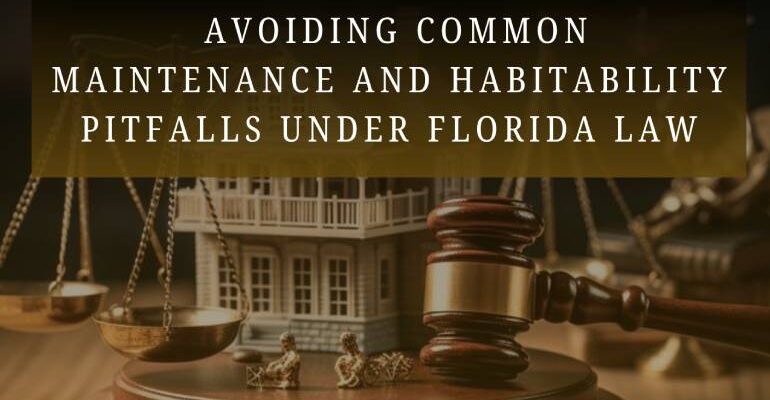What Landlords Can’t Do, What Must Be Repaired
Maintaining a rental property in Florida isn’t just about good management — it’s a legal responsibility. Florida’s landlord-tenant laws
require every landlord to keep their properties safe, sanitary, and habitable. Failing to meet these standards can lead to rent disputes, code violations, or even lawsuits.
Whether you manage one unit or multiple properties, understanding what you’re legally obligated to repair — and what actions to avoid — is essential to staying compliant. Here’s what every Florida landlord should know.
1. What Landlords Can’t Do
Under Florida Statutes §83.51 and §83.67, landlords have specific maintenance duties — and certain actions that are strictly prohibited.
You cannot:
- Ignore repair requests for essential services such as plumbing,heat, or water.
- Retaliate against tenants who report maintenance or code issues to local authorities.
- Shut off utilities or change locks to force tenants out —doing so is considered unlawful “self-help eviction.”
- Charge tenants for major repairs that are legally your responsibility.
- Delay repairs because the tenant is behind on rent or has filed a complaint.
Ignoring or mishandling these situations can expose you to legal penalties and allow tenants to terminate the lease or withhold rent.
2. What Must Be Repaired Under Florida Law
Landlords in Florida are required to provide and maintain safe and habitable housing. The specific standards depend on the type of property (single-family home, apartment, or duplex), but in general, you must:
- Keep the property structurally sound, including roofs, floors, walls, doors, and windows.
- Maintain plumbing, electrical, and heating systems in safe working order.
- Provide running and hot water, as well as sanitary facilities.
- Ensure pest-free and clean conditions through regular maintenance.
- Comply with local building, housing, and health codes.
For single-family homes or duplexes, some repair duties may be
shifted to tenants through the lease agreement — but only if clearly written and agreed upon. However, you can never waive your responsibility for structural safety or habitability.
3. How Long You Can Wait to Make Repairs
Florida law expects landlords to act within a reasonable time after receiving notice of a maintenance issue.
- For urgent issues (like lack of water, electricity, or unsafe conditions), immediate action is required — usually within 24–48 hours
- For non-emergency repairs, landlords typically have seven days after receiving a tenant’s written notice to fix the problem. If repairs aren’t made within that time, tenants may have the right to:
- Withhold rent until the issue is fixed,
- Terminate the lease, or
- Report the problem to local housing or
- code enforcement authorities.
Proper documentation — including dated notices, receipts, and communication records — can protect you if disputes arise.
4. Common Pitfalls to Avoid
Even experienced landlords can fall into traps when it comes to maintenance and habitability. Some of the most common mistakes include:
- Failing to respond promptly to written maintenance requests.
- Relying on unlicensed contractors or “quick fixes” that don’t meet code standards.
- Skipping regular inspections between tenancies.
- Assuming tenants will handle pest control or lawn maintenance without confirming it in the lease.
- Not documenting repair work or communication with tenants.
Proactive maintenance isn’t just about compliance — it protects your investment and minimizes costly legal risks.
5. Why Compliance Matters
Florida’s rental market is competitive — and tenants are increasingly aware of their legal rights. Neglecting maintenance can quickly escalate into rent disputes, code enforcement action, or costly eviction delays. By keeping your properties habitable and addressing repairs quickly, you’ll maintain good tenant relationships and protect your reputation as a responsible landlord.
Conclusion
Landlords in Florida have both ethical and legal obligations to maintain habitable living conditions. When you understand what can’t be ignored, what must be fixed, and how quickly to act, you’ll avoid the common
maintenance pitfalls that cause most disputes.
Contact Us for More Information
Have questions about Florida landlord maintenance laws or need help managing your rental property? Contact us today for expert guidance, legal insights, and landlord support.
Reach Out Here or email us at pronto@abrahamsweeney.com to learn more about compliance and property management best practices.



Leave A Comment